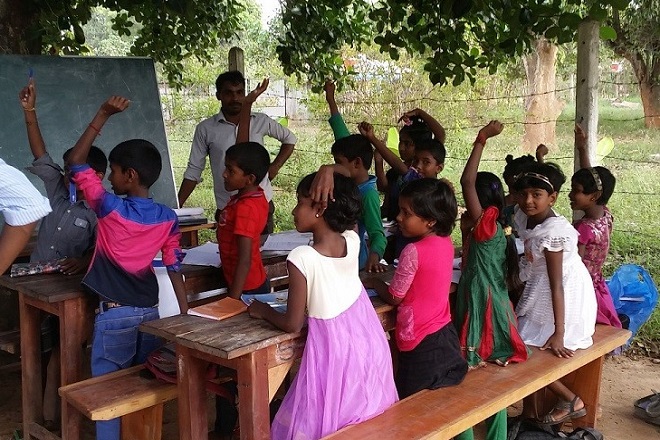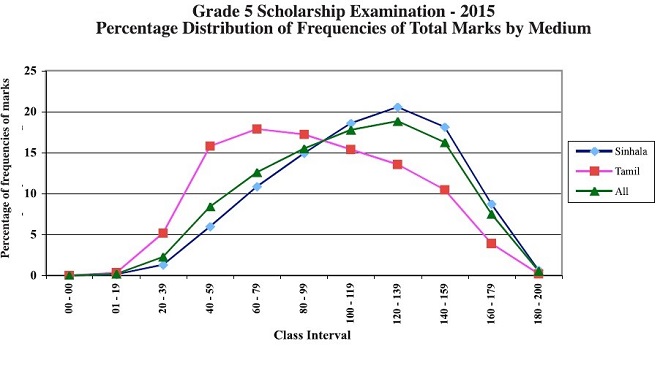 This poor performance is further highlighted by the fact that Tamil medium Grade 5 students (10-11 years old) in Sri Lanka as a group perform even worse than the ‘lower income’ (including all ethnicities) Grade 5 student group.
This poor performance is further highlighted by the fact that Tamil medium Grade 5 students (10-11 years old) in Sri Lanka as a group perform even worse than the ‘lower income’ (including all ethnicities) Grade 5 student group.
 Central Bank figures expose one reason for this. The Northern and Eastern Provinces where the majority of Tamils in Sri Lanka live are in the lowest of the lower income groups. Therefore the impact of low income on academic performance will hit the Tamil medium group particularly hard.
Central Bank figures expose one reason for this. The Northern and Eastern Provinces where the majority of Tamils in Sri Lanka live are in the lowest of the lower income groups. Therefore the impact of low income on academic performance will hit the Tamil medium group particularly hard.

 In addition to poverty the Northern and Eastern provinces have the highest proportion of “Very Difficult” and “Difficult” schools. It is not possible to deduce from this that Poverty causes Difficult Schools. Ministry of Education figures show Sabaragamuwa Province, the second poorest province in Sri Lanka, is second best in terms of having more “Very Congenial” schools and fewer “Very Difficult” schools than all other provinces except the Western Province.
In addition to poverty the Northern and Eastern provinces have the highest proportion of “Very Difficult” and “Difficult” schools. It is not possible to deduce from this that Poverty causes Difficult Schools. Ministry of Education figures show Sabaragamuwa Province, the second poorest province in Sri Lanka, is second best in terms of having more “Very Congenial” schools and fewer “Very Difficult” schools than all other provinces except the Western Province.
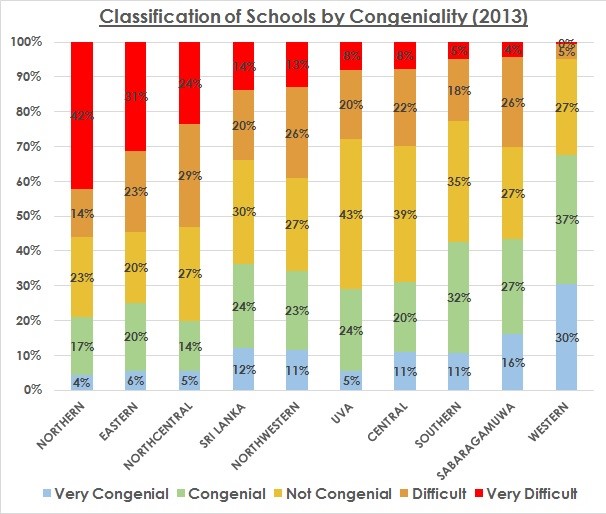 We need to understand what is meant by a “Very Difficult”, i.e. “Very Uncongenial”, school. A report done in 2014 for the Northern Provincial Council, the “2014 Northern Education System Review”, states:
We need to understand what is meant by a “Very Difficult”, i.e. “Very Uncongenial”, school. A report done in 2014 for the Northern Provincial Council, the “2014 Northern Education System Review”, states:
“The ‘Congeniality Index’ is a method of classification that the MOE [Ministry of Education] develo ped in 2007 to depict the level of infrastructure and facilities of schools in a province - the lower the score the worse the infrastructure and facilities.” “Generally speaking the Congeniality Index is derived from the facilities available in the school. There is a relationship of facilities of a school and its remoteness and socioeconomic level of the area. Such communities do not possess enough leverage to get adequate facilities, good teachers or principals. They are in a vicious circle. The Northern, Eastern, and North Central – ‘estate schools’ – are high on the ‘Very Uncongenial’ category ranking.” “Remote schools are not the schools preferred by most teachers. Teachers prefer assignment to schools in their own place of origin or ones that are a short commute from their homes. Cadres in such schools are either not filled or are filled by teachers who are not qualified academically to teach specific subjects at GCE O/L or A/L levels. Teachers who are assigned to these schools for their first appointment, or on mandatory transfer often find loopholes or turn to nepotism and other methods in order to return to an urban school near their place of residence. As observed earlier most of those who are not able to transfer out of the remote school tend to commute to the area on Mondays and return to their place of origin on Fridays. As a result they often miss half of the school day on each of the days when they commute. Most are also counting the days until they will return to a school near their homes.” “[Administrators] capitulate to pressure from higher authorities and politicians to transfer teachers who had been placed in rural schools to urban areas”.
Figures from the Central Bank report “Economic and Social Statistics of Sri Lanka 2016” clearly show graduate teachers, the best qualified, manage to gravitate to the more congenial urban centres:
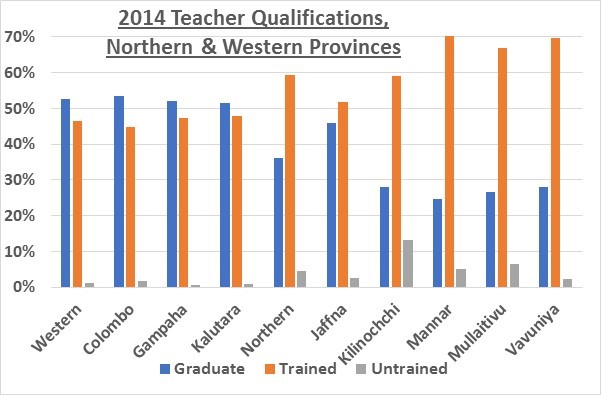 Another very interesting report published in 2002 titled “School Improvement: an action-based case study conducted in a disadvantaged school in Sri Lanka”, by Dr.Subhashinie Wijesundera of Peredeniya University, provides an insight into the issues faced by a disadvantaged school in Derinayagala, Sabaragamuwa Province. The school had 350 students, and a cadre of 14 teachers made up of 1 principal (a graduate); 4 trained teachers; 1 graduate trainee; 6 non-graduate trainees; 2 volunteer teachers. The report comments:
Another very interesting report published in 2002 titled “School Improvement: an action-based case study conducted in a disadvantaged school in Sri Lanka”, by Dr.Subhashinie Wijesundera of Peredeniya University, provides an insight into the issues faced by a disadvantaged school in Derinayagala, Sabaragamuwa Province. The school had 350 students, and a cadre of 14 teachers made up of 1 principal (a graduate); 4 trained teachers; 1 graduate trainee; 6 non-graduate trainees; 2 volunteer teachers. The report comments:
“[The school] is located in a difficult mountainous area where a single bus travels four times a day between the school and the nearest town. The times of the bus, and the school beginning and closing times do not match with each other. Therefore, the teachers who travel by bus to the school have to walk about 1 mile, over difficult terrain, to reach the school in time.” “Two of these new teachers were on ‘punishment transfer’, i.e. they were transferred as a disciplinary measure against them. It is a punishment for them because the present school is considered as a more difficult school. Both of them were unhappy about what had happened to them and they participated reluctantly in the school development activities. It seems that the ‘punishment’ finally fell on the pupils of this already disadvantaged school.” “Traditional methods of teaching are used. Teachers seldom write lesson plans. Audio visual aids rarely used. Remedial teaching does not take place. Teachers are indifferent towards students. Very little opportunities are provided to the pupils for socialisation. There are no student associations. Facilities available for sports are minimal.”Dr. Wijesundera’s report goes on to describe some of the actions the school took to improve its situation. Actions that included getting the staff, pupils and community to become active participants in finding and implementing ways to improve the school and its performance. Actions that are only possible by building the interest energy and enthusiasm of all the stakeholders. Some of these actions cost money. A lot of money if you are scraping a living in a deprived region of Sri Lanka, but probably not a lot if you are living on pounds or dollars in London, New York, Melbourne, Toronto etc. There are many people in the Diaspora earnestly searching for ways to make a difference. The profound and enduring positive difference will come from people creating jobs by employing people directly and by continuously buying goods and services, bringing earned prosperity to the community. But most people in the Diaspora don’t run companies and businesses that can bring the North and East into their supply chains. However most people can still make very important contributions. You could fund school excursions with the price of hiring a bus and driver for a day and buying staff and students’ lunch packets for the trip. You could support a student club with the cost of equipment and materials. Refurbish a classroom with a coat of paint and new furniture. Donate some playground equipment. Upgrade the toilet facilities. Improve the staff room. There are many ways to make a school more Congenial. Raising Congeniality raises the spirits of students and teachers alike, and will raise academic performance. A profound and enduring positive difference will come with good jobs. A profound and enduring negative difference is coming from neglecting children’s education. A report published by the World Bank, “Transforming School Education In Sri Lanka” states:
“Education has a powerful impact on economic welfare in Sri Lanka. Education attainment is positively related to the economic prosperity of households and individuals. As the education levels of the principal income earners of households rise the impact on economic welfare increases. Households where the principal income earner is primary educated have 16 percent better consumption levels than households where the principal income earner is uneducated. Households where the principal income earner has completed basic education have 31 percent higher consumption levels than households where the principal income earner is uneducated. Households in which the principal income earner has completed GCE O/L education have 69 percent higher consumption levels than households where the principal income earner is uneducated. Households where the principal income earner is GCE A/L educated enjoy 119 percent better consumption levels than households where the main income earner is uneducated.”
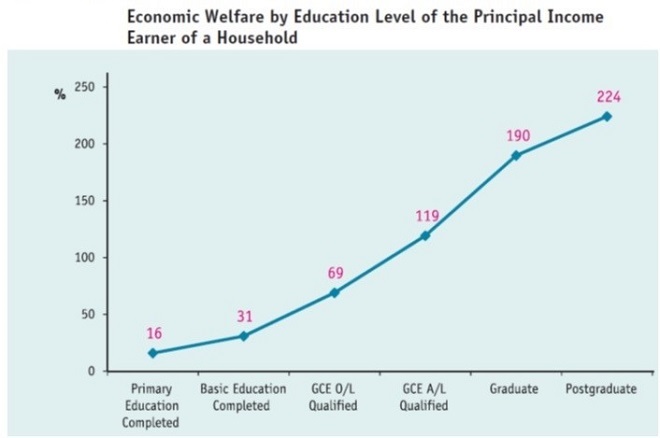 Most people in the Diaspora, individually or in a group, are in a position to make small or medium one off contributions to worthy causes. Many seem to think finding a worthy cause is like finding a needle in a haystack, so they sceptically poke around for a bit and give up. They are mistaken. Particularly in the North it is not about finding a needle in a haystack, it is about choosing a needle from a stack of needles. There are stacks of small and medium worthy causes within Education; Health; Communities; Livelihoods; Small Businesses; Water; Sanitation; etc.
If you are looking for a conveniently accessible stack of needles to search, then the Northern Province Ministry of Education has an illuminating online database: http://www.edudept.np.gov.lk/selectschooldetail.php.
Most people in the Diaspora, individually or in a group, are in a position to make small or medium one off contributions to worthy causes. Many seem to think finding a worthy cause is like finding a needle in a haystack, so they sceptically poke around for a bit and give up. They are mistaken. Particularly in the North it is not about finding a needle in a haystack, it is about choosing a needle from a stack of needles. There are stacks of small and medium worthy causes within Education; Health; Communities; Livelihoods; Small Businesses; Water; Sanitation; etc.
If you are looking for a conveniently accessible stack of needles to search, then the Northern Province Ministry of Education has an illuminating online database: http://www.edudept.np.gov.lk/selectschooldetail.php.
 Here you can find the addresses and contact details supposedly of all schools in the Northern Province, together with each one’s classification on how Congenial or Difficult it is. Look at the database, choose your needle from this stack of needles, visit the school, talk to the principal. And if you have the will then just get on with doing something.
Here you can find the addresses and contact details supposedly of all schools in the Northern Province, together with each one’s classification on how Congenial or Difficult it is. Look at the database, choose your needle from this stack of needles, visit the school, talk to the principal. And if you have the will then just get on with doing something.
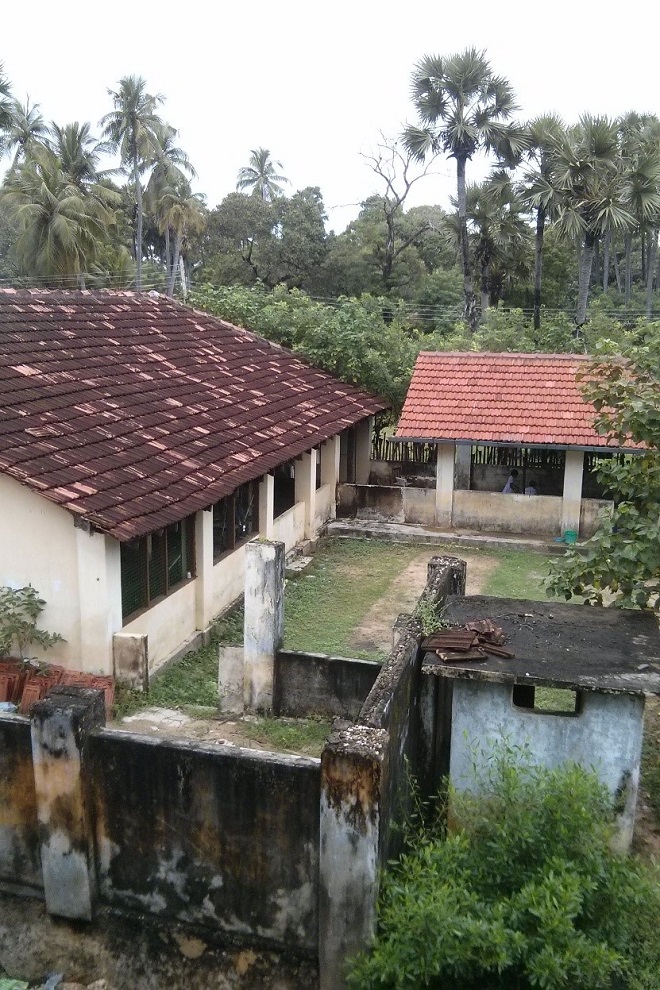 ( — The writer Jekhan Aruliah was born in Sri Lanka and moved with his family to the UK when he was two years of age. Brought up in London, he graduated from Cambridge University in 1986 with a degree in Natural Sciences.
Jekhan then spent over two decades in the IT industry, for half of which he was managing offshore software development for British companies in Colombo and in Gurgaon (India). In 2015 Jekhan decided to move to Jaffna where he is now involved in social and economic projects. He can be contacted at jekhanaruliah@gmail.com — )
( — The writer Jekhan Aruliah was born in Sri Lanka and moved with his family to the UK when he was two years of age. Brought up in London, he graduated from Cambridge University in 1986 with a degree in Natural Sciences.
Jekhan then spent over two decades in the IT industry, for half of which he was managing offshore software development for British companies in Colombo and in Gurgaon (India). In 2015 Jekhan decided to move to Jaffna where he is now involved in social and economic projects. He can be contacted at jekhanaruliah@gmail.com — ) 
